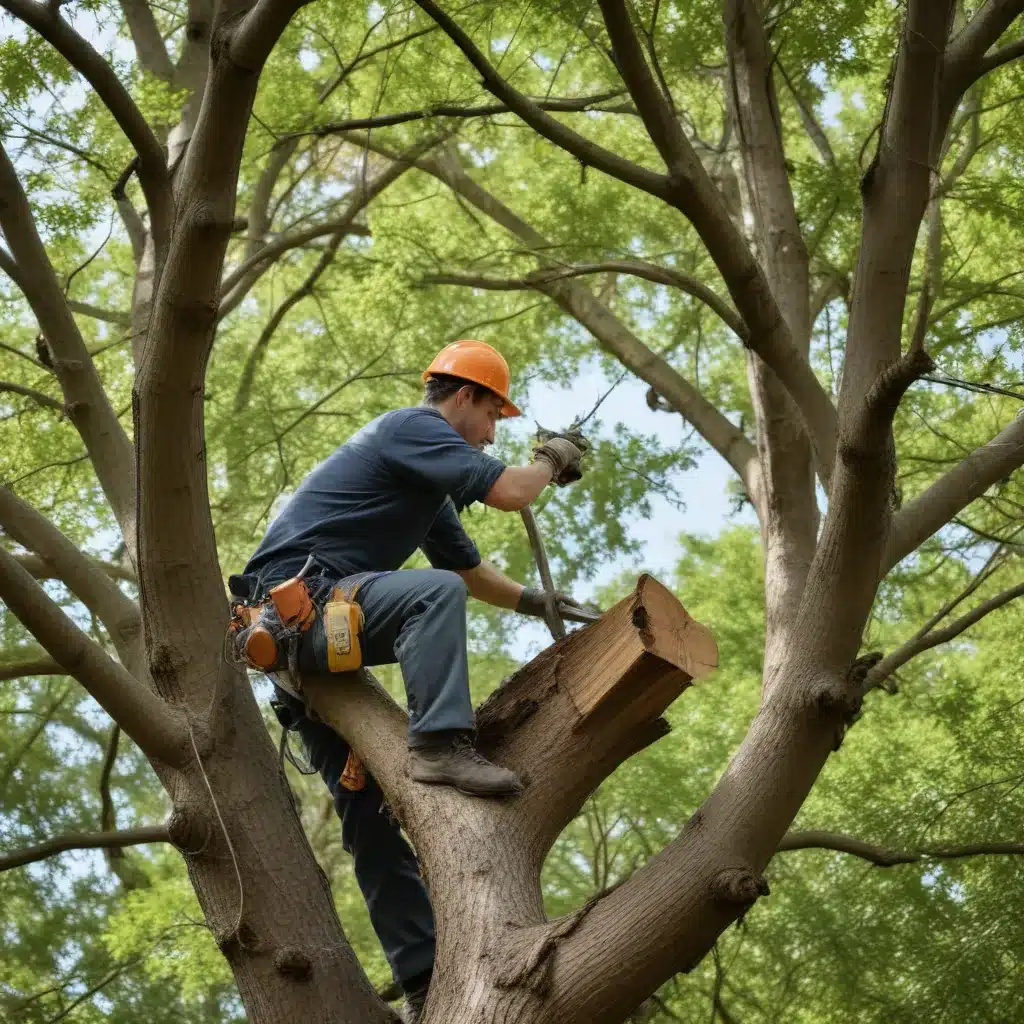
When undertaking a tree removal project, the responsible management of the resulting organic waste is a crucial environmental consideration. TriCounty Tree Care is committed to promoting ecologically-sound practices that minimize the impact on local ecosystems. This article will explore a range of sustainable tree disposal methods, outline the environmental benefits, and provide guidance on navigating relevant regulations.
Tree Disposal Methods
Sustainable Disposal
One of the most environmentally-friendly options for tree disposal is mulching. This process involves mechanically grinding or chipping the woody material into small fragments, which can then be applied as a natural, nutrient-rich surface cover for gardens, flowerbeds, and landscaping features. The decomposition of the mulch helps to improve soil structure, retain moisture, and suppress weed growth. Many municipal waste management programs and private tree care companies offer mulching services to divert this organic matter from landfills.
Another sustainable approach is to repurpose the tree waste as firewood. Properly seasoned and dried logs can provide a renewable energy source for home heating or outdoor fires. This not only reduces waste but also offsets the need for fossil fuels. Homeowners or landscapers may choose to split and stack the timber themselves, or collaborate with local firewood suppliers to have the material processed and distributed.
Environmentally Friendly Disposal
Composting is an excellent way to return the nutrients from tree biomass to the soil. By incorporating the branches, leaves, and other organic matter into a dedicated compost pile or bin, the material can break down over time into a nutrient-rich soil amendment. This closed-loop system helps to reduce waste and support healthy ecosystems by cycling essential elements back into the local environment.
In some cases, the tree waste may be suitable for biofuel production. Woody biomass can be converted into pellets, briquettes, or other solid fuels that can be used for heating or power generation. This process not only diverts material from landfills but also provides a renewable energy source that can displace fossil fuels.
Environmental Considerations
Waste Reduction
Proper disposal of tree waste is essential for minimizing the amount of material that ends up in landfills or is burned, both of which can have significant environmental impacts. By embracing sustainable disposal methods, such as mulching, composting, and biofuel production, the volume of waste can be greatly reduced, preserving valuable landfill space and reducing the release of greenhouse gases.
Ecosystem Preservation
The responsible management of tree waste also plays a crucial role in protecting local ecosystems. When organic matter is allowed to decompose naturally, it helps to enrich the soil and support the growth of diverse plant and animal communities. Conversely, improper disposal, such as open burning or indiscriminate landfilling, can disrupt the delicate balance of these natural systems, leading to habitat loss and the degradation of air and water quality.
Sustainable Tree Removal
Responsible Removal Practices
To further enhance the environmental benefits of tree disposal, TriCounty Tree Care advocates for selective removal and minimizing tree damage during the removal process. By carefully identifying trees that pose safety risks or interfere with infrastructure, we can reduce the overall amount of waste generated while preserving the ecological value of the remaining trees and their associated habitats.
Repurposing Tree Waste
In addition to the disposal methods mentioned earlier, TriCounty Tree Care also explores opportunities to repurpose tree waste in innovative ways. For example, the wood chips produced during the mulching process can be used to create custom pathways, playground surfaces, or even bio-based building materials. Similarly, the larger logs may be milled into lumber for use in furniture, fencing, or landscaping features, further extending the life cycle of the tree biomass.
Recycling Tree Biomass
Composting Tree Debris
One of the most effective ways to recycle tree biomass is through composting. By incorporating the leaves, branches, and other organic matter into a yard waste composting system or partnering with commercial composting facilities, the nutrients can be transformed into a valuable soil amendment that enhances the fertility and water-holding capacity of the soil. This closed-loop approach helps to minimize waste while supporting the growth of healthy, vibrant landscapes.
Biofuel Production
Another innovative approach to tree waste recycling is the conversion of woody biomass into biofuels. Through specialized processes, the cellulose and lignin components of the tree material can be converted into pellets, briquettes, or other solid fuels that can be used for heating or power generation. This renewable energy source helps to offset the use of fossil fuels, reducing the overall carbon footprint of the tree removal and disposal process.
Disposal Regulations
Local Ordinances
When planning a tree removal project, it is essential to familiarize yourself with the local ordinances and regulations that may govern the disposal of the resulting waste. Many municipalities have specific guidelines or requirements, such as the need for tree removal permits, the prohibited burning of tree debris, or the mandatory use of designated disposal facilities. Adhering to these regulations helps to ensure compliance and minimize the environmental impact of the tree removal process.
Waste Management Programs
In addition to local regulations, homeowners and landscapers should also be aware of the waste management programs available in their area. Some municipalities or waste management companies may offer curbside pickup or drop-off services for tree waste, facilitating the diversion of this organic material from landfills. Exploring these options can help to streamline the disposal process and promote more sustainable practices.
By embracing sustainable tree disposal methods, minimizing waste, and supporting healthy ecosystems, TriCounty Tree Care is committed to providing our clients with environmentally responsible solutions for their tree removal needs. For more information on our services or to schedule a consultation, please visit www.tricountytreecare.com.


